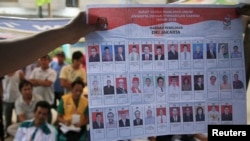Stocks fell more than three percent in Indonesia Thursday following a weaker than expected parliamentary election performance by the country's main opposition party.
Unofficial tallies suggest the Indonesian Democratic Party of Struggle (PDI-P) will need to form a coalition government after winning nearly 20 percent of Wednesday's vote.
Parties must win 25 percent of the vote, or 20 percent of seats in parliament, in order to nominate a presidential candidate on their own for July's election.
The PDI-P's candidate, Jakarta Governor Joko Widodo, is still expected to become Indonesia's next president. He has said he is open to a power-sharing agreement.
But many investors fear that a power-sharing deal could complicate economic reforms they feel are needed to further grow Southeast Asia's largest economy.
Indonesia's economy is expected to grow around five percent this year, but has recently been slowed by problems including weak infrastructure and government corruption.
Widodo, known as "Jokowi," represents a welcome change for many Indonesians. The ex-furniture businessman has a reputation for transparency and a hands-on approach to governance.
Current President Susilo Bambang Yudhoyono's Democratic Party has suffered a string of high-level corruption scandals and did not fair well in the vote.
More than 200,000 candidates from 12 parties were competing for 20,000 seats in national and regional legislatures.
Official results will be announced by May 9. The presidential election is on July 9.
Wednesday's vote was Indonesia's fourth opportunity to democratically elect its parliament since the collapse of former leader Suharto's 32-year authoritarian rule.
Unofficial tallies suggest the Indonesian Democratic Party of Struggle (PDI-P) will need to form a coalition government after winning nearly 20 percent of Wednesday's vote.
Parties must win 25 percent of the vote, or 20 percent of seats in parliament, in order to nominate a presidential candidate on their own for July's election.
The PDI-P's candidate, Jakarta Governor Joko Widodo, is still expected to become Indonesia's next president. He has said he is open to a power-sharing agreement.
But many investors fear that a power-sharing deal could complicate economic reforms they feel are needed to further grow Southeast Asia's largest economy.
Indonesia's economy is expected to grow around five percent this year, but has recently been slowed by problems including weak infrastructure and government corruption.
Widodo, known as "Jokowi," represents a welcome change for many Indonesians. The ex-furniture businessman has a reputation for transparency and a hands-on approach to governance.
Current President Susilo Bambang Yudhoyono's Democratic Party has suffered a string of high-level corruption scandals and did not fair well in the vote.
More than 200,000 candidates from 12 parties were competing for 20,000 seats in national and regional legislatures.
Official results will be announced by May 9. The presidential election is on July 9.
Wednesday's vote was Indonesia's fourth opportunity to democratically elect its parliament since the collapse of former leader Suharto's 32-year authoritarian rule.





